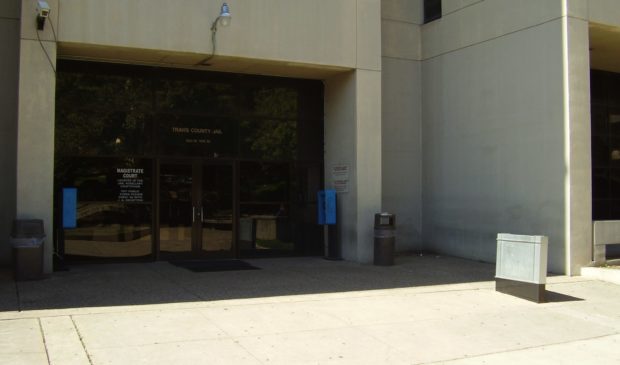Judicial Committee members call for efficient quick release process at county jail
Wednesday, April 8, 2020 by
Ryan Thornton On any given day, the majority of individuals held in the Travis County Jail have not yet had a trial or been convicted of the crime that landed them there, yet they cannot afford to pay the bondsman’s fee or cash bail amount needed to secure their release.
Acknowledging the city’s limited authority in county justice procedures, the four members of the City Council Judicial Committee – Mayor Pro Tem Delia Garza and Council members Jimmy Flannigan, Natasha Harper-Madison, and Greg Casar – are proposing amendments to the city’s interlocal agreement with the county in an effort to put an end to wealth-based pretrial detention.
Garza said while the city can’t dictate the actions of judges, the city can express a strong desire for a constitutional and efficient magistration process for magistrate hearings conducted by Austin Municipal Court judges.
A magistrate hearing determines if there is probable cause for a warrantless arrest. If no probable cause is found, individuals are to be immediately released.
Garza said the resolution calls for additional measures to ensure that the county jail is not a debtor’s prison where presumptively innocent individuals are detained for the sole reason that they can’t afford to buy their release. If approved Thursday, City Manager Spencer Cronk will be directed to convene a working group that was intended to meet in February to determine the least restrictive pretrial conditions possible while still assuring public safety.
Based on conversations with county officials, Council Member Leslie Pool said the proposed magistration process could cost the city millions of dollars and could also cost the county anywhere between $2 million and $4 million to implement. She argued for a more collaborative approach that acknowledges the work the county is doing to improve criminal justice as well as the fact that municipal court judges acting as magistrates for the county are entirely under the county’s authority in that role.
“I think we should take time to meet with the county, learn about any possible unintended consequences,” Pool said.
“Efforts on issues that (Garza) is bringing are already in effect or are underway to pilot at the county level, so considering the fact that we cannot effect either the judiciary, because of the separation of powers, and we cannot tell Travis County how to do its work, I would like to understand how what’s in the item would change the procedures and processes that we already have in place with our municipal courts.”
According to Garza, nobody on the city payroll has told her that the amendments would require millions of dollars. Many of the suggestions, she said, are aspirational rather than prescriptive and ask for new measures like data collection on individuals who remain in jail following a magistrate hearing, which is not currently available.
“We know we’re not going to change outcomes if we don’t know what data we’re getting,” Garza said.
In a phone call with County Judge Sarah Eckhardt over the weekend, Casar said Eckhardt expressed “full support of every ‘be-it-resolved’” clause in the resolution while offering some suggested edits.
Pool also took issue with the lack of public vetting via discussion at the Judicial Committee and the poor timing of the resolution in the middle of a public health and economic crisis. Flannigan noted, however, that each of the committee’s members are listed sponsors of the item.
On Feb. 6, Travis County Court at Law judges issued a standing order expanding use of personal bonds instead of cash bail for most nonviolent misdemeanors. To prevent an outbreak of Covid-19 at the county jail, district judges issued an order March 24 allowing use of automatic personal bonds in place of cash bail for many nonviolent felonies.
As the resolution notes, however, the county charges a personal bond fee of the greater of $20 or 3 percent of the set bail amount plus costs associated with the bond which, the resolution states, “can be crippling for working-class families.”
The Austin Monitor’s work is made possible by donations from the community. Though our reporting covers donors from time to time, we are careful to keep business and editorial efforts separate while maintaining transparency. A complete list of donors is available here, and our code of ethics is explained here.
You're a community leader
And we’re honored you look to us for serious, in-depth news. You know a strong community needs local and dedicated watchdog reporting. We’re here for you and that won’t change. Now will you take the powerful next step and support our nonprofit news organization?






